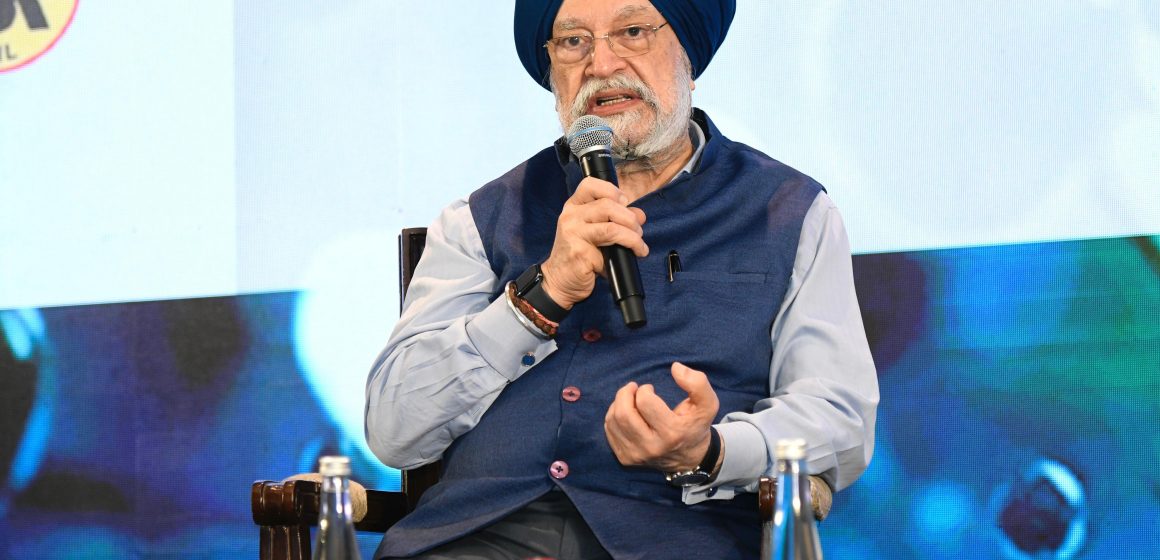Amid global crude price volatility, domestic fuel rates have been reduced through targeted government measures to uphold energy security, affordability, and access for all, Puri stated.
India’s Ethanol Blended Petrol (EBP) Programme has generated ₹1.25 trillion ($15 billion) in income for farmers between Ethanol Supply Year (ESY) 2014-15 and July 2025, Union Minister for Petroleum and Natural Gas Hardeep Singh Puri informed Parliament on Thursday.
The initiative has also led to foreign exchange savings of over ₹1.44 trillion ($17.3 billion), a net carbon dioxide reduction of approximately 73.6 million metric tonnes (MMT), and the substitution of more than 24.4 MMT of crude oil.
Responding to a starred question in the Lok Sabha, Puri said the government has been actively promoting ethanol blending in petrol to support environmental sustainability, reduce crude oil import dependency and strengthen the domestic agriculture sector.
Under the National Policy on Biofuels, the EBP Programme enabled public sector oil marketing companies (OMCs) to achieve 10 per cent ethanol blending in petrol by June 2022, five months ahead of schedule during ESY2021-22. Blending levels rose to 12.06 per cent in ESY 2022-23, 14.60 per cent in ESY 2023-24, and 19.05 per cent as of July 31 in the ongoing ESY2024–25. In July 2025 alone, ethanol blending reached 19.93 per cent.
To support ethanol production, the government has expanded the range of feedstocks, introduced administered pricing for ethanol procurement, and reduced the GST rate to 5 per cent for ethanol used in the EBP Programme. It has also launched several Ethanol Interest Subvention Schemes (EISS) between 2018 and 2022, including a dedicated scheme for cooperative sugar mills to convert sugarcane-based distilleries into multi-feedstock plants using molasses and grains.
Additional measures include Long-Term Offtake Agreements (LTOAs) between OMCs and dedicated ethanol plants, multimodal transportation to improve ethanol availability, and increased storage capacity and allied infrastructure.
To facilitate advanced biofuel production, the government notified the Pradhan Mantri JI-VAN (Jaiv Indhan–Vatavaran Anukool Fasal Awashesh Nivaran) Yojana in 2019, with amendments in 2024. The scheme supports the establishment of advanced biofuel projects using lignocellulosic biomass and other renewable feedstocks such as crop residue. It aims to provide remunerative income to farmers for agricultural waste, create employment opportunities, reduce pollution from biomass burning, and contribute to the Swachh Bharat Mission.
The JI-VAN scheme has a total financial outlay of ₹19.7 billion, with ₹18 billion allocated for commercial-scale projects and ₹1.5 billion for demonstration-scale initiatives.
The government has also taken steps to promote biodiesel use, including setting indicative blending targets, allowing direct sale under the National Policy on Biofuels, issuing guidelines for blending with high-speed diesel, and reducing the GST rate from 12 to 5 per cent.
Safeguarding Consumer Interest
In a separate response to another starred question, Puri reiterated the government’s commitment to ensuring energy security, affordability and accessibility. Despite fluctuations in international crude oil prices, domestic petrol and diesel prices have been reduced through various interventions.
Crude oil prices (Indian basket) rose from $55 per barrel in March 2015 to $113 in March 2022, peaking at $116 in June 2022. However, domestic prices in Delhi fell from ₹110.04 and ₹98.42 per litre for petrol and diesel, respectively, in November 2021, to ₹94.77 and ₹87.67 per litre.
The government reduced excise duty by ₹13 per litre on petrol and ₹16 per litre on diesel in two tranches in November 2021 and May 2022, passing the benefit to consumers. Several state governments also reduced VAT. In March 2024, OMCs cut retail prices by ₹2 per litre, and in April 2025, an excise duty hike of ₹2 per litre was absorbed without burdening consumers.
Public sector OMCs also rationalised intra-state freight, lowering fuel prices in remote areas and narrowing price disparities within states.
To further insulate citizens from global price shocks, the government diversified its crude import basket, invoked Universal Service Obligation provisions to ensure domestic fuel availability, and ramped up domestic exploration and production.


